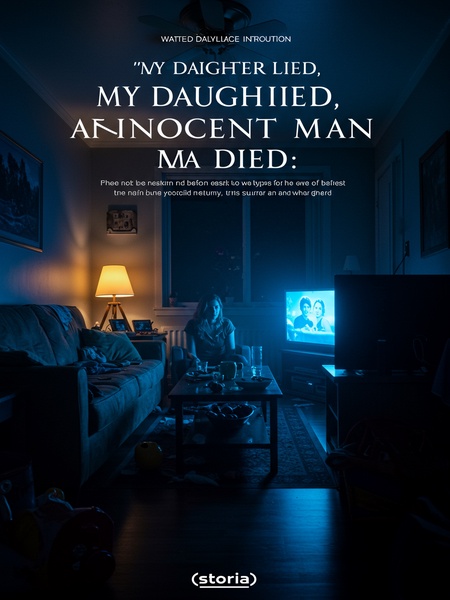Chapter 2: Doubt in the Dark
From what I knew, Mark Jennings was a responsible guy. All the years my daughter rode the bus, Mark was never late. I found it hard to believe someone like him would hurt kids.
I remembered how he once waited ten minutes for a kid who forgot his backpack, or how he drove through a snowstorm to get everyone home safe. None of it fit with the accusations.
So I decided to question my daughter again.
That night, as she sat at the dining table coloring, I tried to keep my voice gentle but steady. I just wanted the truth.
"Tell me, what number were you when Mark touched you? Who was before you? Who was after?"
Her crayon hovered over the paper. She fidgeted, eyes darting to the side, unable to answer. I could see her thinking, searching for an answer.
These should’ve been easy questions, but she hesitated for a long time and couldn’t answer. So I pressed her: "Tell Dad the truth—did Mark really touch you?"
My voice wavered. She burst into sudden, raw sobs, her shoulders shaking. It broke my heart, but I couldn’t let it go.
My daughter’s tears brought my wife storming in, furious that I’d even ask. "How could you not trust your own child? We’re her parents—we stand by her, no matter what."
She stood over me, her voice sharp, demanding I apologize. The room felt smaller, like the walls were closing in.
"Whether Mark’s innocent is for the police to decide. What does it have to do with us? At worst, we just apologize to him."
She was just so matter-of-fact it made my skin crawl. I wanted to argue, but her exhaustion told me it was pointless tonight.
I was speechless, but she wasn’t wrong. The police are professionals—they wouldn’t accuse an innocent person, right?
I tried to trust the system, but something nagged at the back of my mind.
The police checked the bus’s cameras and GPS. Mark drove by the book that day. Unless he could molest kids while driving, there was no time for it.
They went through the footage frame by frame—kids bouncing, sunlight streaking the seats. Nothing out of place. GPS logs were solid.
Still, they ran forensic tests on the five girls. No fingerprints, but a small amount of DNA was found, so intimate contact couldn’t be ruled out.
The phrase hung in the air like a storm cloud. DNA—but not fingerprints. I tried to make sense of it and felt more lost than ever.
The police’s final report was vague: "No direct evidence of molestation was found."
It sounded official but offered no closure—just more questions. My wife sat staring at her phone, waiting for the next shoe to drop.
As soon as the report came out, the parents exploded. They said the investigation was half-baked and started calling to complain everywhere.
The group chat was a minefield—screenshots and caps-locked rants flying back and forth. Some threatened to call local news, desperate for justice.
A few hours later, the police changed their statement: "It is impossible to rule out the suspect’s possibility of committing the crime."
One line changed everything. The tension in the room spiked, my phone buzzing non-stop as rumors swept through the building like wildfire.
Even though the two statements were almost the same, the effect was totally different, because the district attorney opened a case based on the second statement.
Legal wheels turned fast. My phone rang with calls from numbers I didn’t recognize—reporters, lawyers, relatives from out of state.
Given the number of victims and that they were all girls, the prosecution pushed for the maximum—seven years.
My stomach dropped. Seven years. It felt both too much and not enough, depending on which side you were on. My wife started making lists: school, work, therapy.
The case went to trial quickly. Mark brought two witnesses. The first was his former company commander, who testified that Mark was disciplined and upright, even recognized for helping during Hurricane Katrina. Someone like him, the commander said, couldn’t do something like this.
I watched the commander—broad-shouldered, rumpled suit—steady his voice and speak for Mark. The judge just nodded, scribbling notes.
The second witness was Mark’s mother. The old woman sobbed in court. "If it weren’t for my illness, my son would have married long ago. He’s a good, devoted son. He would never do something so awful..."
Her hands shook as she clutched a tissue. In the back row, a few people wiped their eyes. The courtroom air was heavy.
Though they presented evidence of Mark’s good character, it didn’t matter. Only God knows what really happened that afternoon.
The jury looked tired, restless, wanting to be anywhere but there. The prosecutor hammered the uncertainty, but the narrative seemed set.
In the end, Mark was found guilty of molestation and sentenced to five years in state prison.
The news hit our neighborhood like a tornado. Some felt justice was done; others whispered something didn’t add up. My daughter just stared out the window at dinner, pushing her food around.
Mark appealed. The parents wanted a harsher sentence and were full of complaints.
The group chat was a minefield—arguments late into the night. Some wanted Mark locked up forever; others just wanted to move on. My wife muted her phone and went to bed early.
Continue the story in our mobile app.
Seamless progress sync · Free reading · Offline chapters